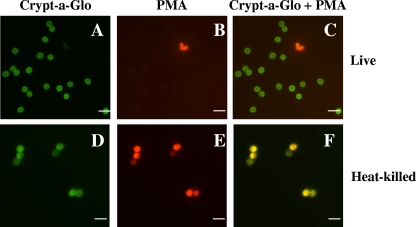Cryptosporidium is a crucial waterborne protozoan parasite that may trigger extreme diarrhea and demise within the immunocompromised. The present strategies used to observe for Cryptosporidium oocysts in water are the microscopy-based USEPA strategies 1622 and 1623.
These strategies assess complete ranges of oocysts in supply waters, however don’t decide oocyst viability or genotype. Recently, propidium monoazide (PMA) has been used together with molecular diagnostic instruments to establish species and assess the viability of micro organism.
The objective of this research was the event of a Cryptosporidium PMA-PCR (CryptoPMA-PCR) assay that features PMA remedy previous to PCR evaluation so as to stop the amplification of DNA from useless oocysts. The outcomes demonstrated that PMA penetrates solely useless oocysts and blocks amplification of their DNA.
The CryptoPMA-PCR assay also can particularly detect stay oocysts inside a blended inhabitants of stay and useless oocysts. More importantly, stay oocysts, not useless oocysts, had been detected in uncooked waste or floor water samples spiked with Cryptosporidium oocysts. This proof-of-concept research is the primary to reveal the use of PMA for pre-PCR remedy of Cryptosporidium oocysts.
The CryptoPMA-PCR assay is a pretty method to particularly detect and genotype viable Cryptosporidium oocysts within the water, which is important for human well being threat evaluation.

Validation of a CYP2D6 genotyping panel on the NanoChip Molecular Biology Workstation.
BACKGROUNDCYP2D6 is a extremely polymorphic section I enzyme that metabolizes 20%-25% of clinically used medicine. The goal of this research was to validate a CYP2D6 genotyping assay with the NanoChip Molecular Biology Workstation.
METHODSWe genotyped 200 anonymized human DNA samples with the Pyrosequencing platform on the Medical College of Wisconsin and with the NanoChip platform at Dartmouth Medical School.
We in contrast CYP2D6 genotypes and resolved samples with genotypic discrepancies with the Jurilab CYP2D6 duplication/deletion assay or with conventional DNA sequencing. The Jurilab assay is a long-range PCR assay used to guage sequence buildings 3′ of the CYP2D7 and CYP2D6 coding areas.
For the NanoChip platform, we carried out multipad addressing and duplicate runs to check the intra- and intercartridge precision, within- and between-run precision, and reproducibility of the outlined genotypes.RESULTSWe used each platforms to genotype all 200 DNA samples for CYP2D6*3, *4, *5, *6, *7, *8, and gene duplication.
The 2 strategies confirmed 99.4% concordance within the genotyping outcomes; we discovered solely Eight discrepant genotypes amongst 1400 DNA analyses. Confirmatory molecular evaluation of the discrepant genotypes revealed that the NanoChip assay confirmed higher settlement. The imprecision of the NanoChip technique (CV) was 8.9%-17.7%.CONCLUSIONSThis validation research of the NanoChip digital microarray-based CYP2D6 genotyping assay revealed a CV <20% and good concordance with the Pyrosequencing technique and a confirmatory sequencing technique.
